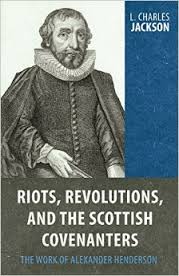This is an important book for a number of reasons. The first is the timing — and it is almost as though a higher power were at work. In this book, Charles Jackson gives a fresh historical overview of the work of Alexander Henderson, one of the stalwarts among the Scottish Covenanters. There was a time when Christians with a backbone used to give the ruling elite the fits, and it is long past time for us to be reading up on them.
Civil resistance from Christians is not a phenomenon that arises from nowhere — it requires a theology. Not only so, but it requires a theology that is faithful to Scripture. Left to themselves, without godly leadership, too many Christians simply assume that “Romans 13” — the catchphrase, not the actual text — requires craven acquiescence. With theological rigor and subtlety, Henderson (and others with him) showed quite the contrary. And those who wanted to maintain unquestioned and unquestioning rule were frequently not happy about it.
“One can only imagine the king’s fury in being told that what he considered treasonous rebellion, Henderson was defining as godly beneficence toward him. This is most certainly why Henderson was said to have made his majesty run ‘starke mad'” (p. 86).
Speaking of theological rigor and subtlety, Jackson does good work in vindicating the intellectual reputation of those faithful theologians and preachers of Scotland who resisted the tyrannies of their day. The received standard view is that the Calvinist leaders of seventeenth century Scotland were a gaggle of unimaginative dullards which, to the unimaginative dullards of our own day, is quite a satisfying slander. Jackson dispatches this view with a number of helpful observations. “The leaders of the Second Reformation in Scotland were very much humanists and were trained in a context rich with a wide variety of sources including ancient, medieval and Renaissance” (p. 24).
After Knox, and perhaps Melville, Scotland owed her liberty to Henderson. Downstream from that troubled time, because of all the Scots and Scots/Irish who emigrated here, we owe much of our liberty to him as well. Out liberties have eroded as much as they have because we have forgotten that fact. For those interested in the work of recovery, this book is a great place to start.
“Alexander Henderson created the National Covenant of 1638 to serve as theological and constitutional pillars on which the Covenanters based their resistance to Charles I” (p. 49).
Henderson understood that resistance to tyranny is a work of architecture; if you want the roof to stay up, you have to have pillars. Get this book. Read it, and stand ready to be inspired.

